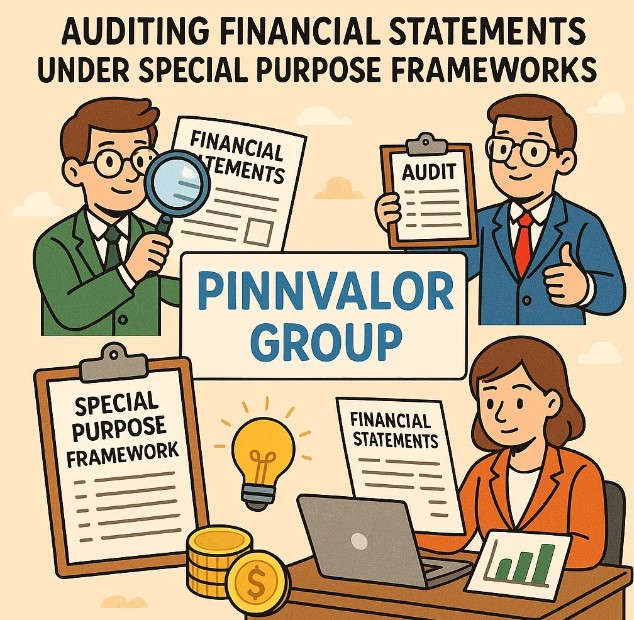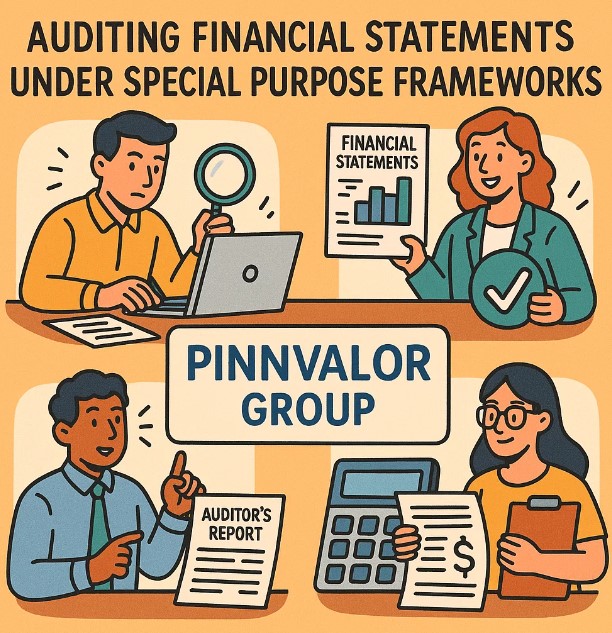
Wanna make sure your financial statements meet all regulatory requirements? Let's dive into how special purpose frameworks (SPFs) come into play in audits.
When businesses prepare financial statements under special purpose frameworks (SPFs), they are tailoring the information for a specific purpose, whether it’s for regulatory compliance, tax reporting, or fulfilling contract requirements. These frameworks differ significantly from the Generally Accepted Accounting Principles (GAAP) or International Financial Reporting Standards (IFRS), and as such, audits of such statements require special attention to ensure that the framework’s requirements are met, and the financial statements are fairly presented.
Auditors must exercise additional caution and judgment in these engagements because the special nature of SPFs can lead to complexities and potential misinterpretations. This blog takes you through the critical aspects auditors need to consider when auditing financial statements prepared under SPFs.
A well-executed audit of special purpose financial statements goes beyond just reviewing numbers. It’s about fostering trust with stakeholders by providing clear, transparent, and compliant financial information that aligns with the intended purpose of the framework.
What is a Special Purpose Framework (SPF)?
A Special Purpose Framework refers to a set of accounting principles and procedures used to prepare financial statements that cater to specific needs and are not designed for general-purpose use. SPFs can be tailored for:
- Tax reporting: Using a tax basis of accounting, often simplified and not following GAAP/IFRS.
- Regulatory frameworks: Common in industries such as banking, insurance, or utilities, where regulatory bodies prescribe specific reporting frameworks.
- Contractual frameworks: Designed to fulfill requirements of private agreements or specific conditions in loan covenants.
Since these frameworks are meant to address specific stakeholder needs, the financial statements may not fully represent the general financial performance of the entity in the broader market context.
Special Considerations in Auditing SPFs
1. Understanding the Framework’s Purpose
The auditor’s first task is to understand the nature of the SPF used to prepare the financial statements. This includes recognizing the accounting methods, disclosures, and treatment of transactions that differ from the more common frameworks like GAAP or IFRS. It’s important for auditors to fully grasp:
- The intended users of the financial statements (e.g., tax authorities, lenders, regulators).
- How the framework impacts the financial statement presentation and disclosures.
Without understanding the purpose and application of the SPF, the auditor cannot accurately assess the correctness of the financial statements.
2. Ensuring Compliance with the SPF
Unlike financial statements prepared using GAAP or IFRS, which have standardized recognition, measurement, and disclosure rules, SPFs can vary significantly. Auditors need to ensure that the financial statements are fully compliant with the specific framework. This may involve:
- Verifying that the correct recognition and measurement criteria have been applied.
- Reviewing whether there are any material departures from the prescribed framework, and if so, whether these departures are clearly disclosed.
For example, an entity might prepare statements on a cash basis for tax reporting, which might only recognize revenues when received, instead of when earned. The auditor needs to ensure this is appropriately reflected.
3. Modifications to the Auditor’s Report
Audits of financial statements prepared under SPFs often require modifications to the auditor’s report. This is primarily due to the nature of SPFs differing from the full set of financial accounting principles such as GAAP or IFRS. The auditor may need to:
- Highlight the use of an SPF in an Emphasis of Matter paragraph.
- Provide a qualified opinion if the framework has not been applied correctly or consistently.
- Clarify the scope limitations in the auditor’s report, ensuring that the report reflects the framework’s limited applicability for general use.
These modifications help users of the financial statements understand that the financial data is not prepared according to the general-purpose standards, like GAAP or IFRS, and is tailored for specific requirements.
4. Disclosures and Transparency
A critical aspect of auditing financial statements prepared under SPFs is ensuring that the disclosures are clear and comprehensive. Since these financial statements are usually prepared for specific purposes, the auditor needs to confirm that:
- The framework’s nature is clearly disclosed.
- The limitations of the financial statements are transparent.
- The impact of using a special purpose framework on the financial data is adequately conveyed to the users.
For instance, if a company prepares financial statements on a cash basis for tax reporting, the disclosures should clearly indicate this and explain how it affects the recognition of revenues and expenses.
5. Reporting to the Users
Because special-purpose financial statements are prepared for specific users (e.g., tax authorities, regulatory bodies), auditors must ensure that the intended audience understands the limitations of the financial statements. This requires the auditor to consider the level of knowledge the users have about the SPF. The auditor should:
- Ensure that the limitations of the financial statements are fully explained.
- Modify the audit report if necessary to reflect the SPF’s impact on the financial statements.
This is particularly important because users unfamiliar with the SPF might misinterpret the financial statements if the necessary disclosures are not made.

Conclusion: Ensuring Accuracy in Special Purpose Framework Audits
Auditing financial statements prepared under special purpose frameworks requires careful attention to the unique aspects of these frameworks. The auditor’s role is not just to ensure compliance with the framework but also to make sure that users understand the financial statements’ purpose, limitations, and impact on decision-making.
By thoroughly understanding the SPF, ensuring full compliance, making the necessary modifications to the audit report, and ensuring adequate disclosures, auditors can provide valuable insights and guidance to stakeholders relying on these tailored financial statements.
So, if you're preparing financial statements under an SPF or preparing for an audit under one, ensure that these key considerations are at the forefront to guarantee transparency, compliance, and clarity for all users.
Do you need expert help with auditing your special purpose financial statements? PinnValor Group’s financial advisory services ensure that your statements comply with all regulatory frameworks, no matter the specificity of the purpose. Contact us today!
